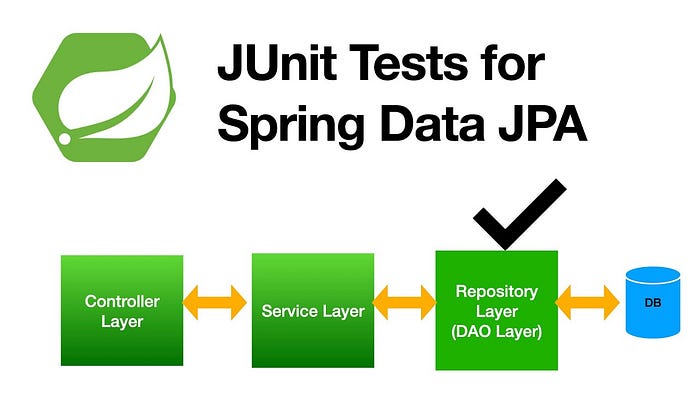Spring Boot Unit Testing for Repository Layer
@DataJpaTest @BeforeEach

Spring Boot — Unit Testing Repository Layer
In this blog describe how to to perform unit test for repository layer. Well organize coding example is given is the below GitHub repository.Please check out the repository.
Test Case Structure
When writing test cases, it is beneficial to follow the “given-when-then” structure to provide clear and concise test descriptions. Here’s an example:
@Test
public void given_when_then() {
// Given: Setup object or precondition
// When: Action or behavior that we are going to test
// Then: Verify the output or expected result
}Annotation Details
@DataJpaTest
The @DataJpaTest annotation in Spring Boot is used for integration testing of JPA repositories. It provides a convenient way to test the persistence layer of your application by automatically configuring an in-memory database, creating a TestEntityManager, and setting up a transactional test environment. It focuses on loading the repository layer only.
@BeforeEach
The @BeforeEach annotation in JUnit 5 is used to signal that a method should be executed before each test method in a test class. It allows you to set up the necessary preconditions or perform any common initialization steps before running each individual test.
For Repository
Create a folder repository in main -> java and inside create folder repository and EmployeeRepository.java class .
EmployeeRepository.java
@Repository
public interface EmployeeRepository extends JpaRepository<Employee,Long>{
Optional<Employee> findByEmail(String email);
// Define custom query using JPQL with index params
@Query("select e from Employee e where e.firstName = ?1 and e.lastName = ?2")
Employee findByJPQL(String firstName, String lastName);
// Define custom query using JPQL with name params
@Query("select e from Employee e where e.firstName = :firstName and e.lastName = :lastName")
// Employee findByJPQLNameParams(String firstName, String lastName); // This is also works fine because params name and parameter name is sanme
Employee findByJPQLNameParams(@Param("firstName") String firstName, @Param("lastName") String lastName);
// Define custom query native sql query with index param
@Query(value= "select * from employees e where e.first_name = ?1 and e.last_name = ?2", nativeQuery = true )
Employee findByNativeSQL(String firstName, String lastName);
// Define custom query native sql query with name param
@Query(value= "select * from employees e where e.first_name =:firstName and e.last_name = :lastName", nativeQuery = true )
Employee findByNativeSQLNameParam(@Param("firstName") String firstName, @Param("lastName") String lastName);
}For Test class
Create a folder repository and inside create EmployeeRepositoryTests.java class .
EmployeeRepositoryTests.java
@DataJpaTest
public class EmployeeRepositoryTests {
@Autowired
private EmployeeRepository employeeRepository;
private Employee employee;
@BeforeEach
public void setupTestData(){
// Given : Setup object or precondition
employee = Employee.builder()
.firstName("MOHOSIN")
.lastName("MIAH")
.email("mohosinmiah1610@gmail.com")
.departmentCode("CSE")
.build();
}
// JUnit Test for save employee operation
@Test
@DisplayName("JUnit test for save employee operation")
public void givenEmployeeObject_whenSave_thenReturnSaveEmployee(){
// When : Action of behavious that we are going to test
Employee saveEmployee = employeeRepository.save(employee);
// Then : Verify the output
assertThat(saveEmployee).isNotNull();
assertThat(saveEmployee.getId()).isGreaterThan(0);
}
// JUnit test for get Employee List operation
@Test
@DisplayName("JUnit test for get Employee List")
public void givenEmployeeList_whenFindAll_thenEmployeeList(){
// Given : Setup object or precondition
Employee employeeOne = Employee.builder()
.firstName("MOHOSIN One")
.lastName("MIAH One")
.email("mohosinmiah1610@gmail.com")
.departmentCode("CSE")
.build();
Employee employeeTwo = Employee.builder()
.firstName("MOHOSIN Two")
.lastName("MIAH Two")
.email("mohosinmiah1610@gmail.com")
.departmentCode("CSE")
.build();
employeeRepository.save(employeeOne);
employeeRepository.save(employeeTwo);
// When : Action of behavious that we are going to test
List<Employee> employees = employeeRepository.findAll();
// Then : Verify the output
assertThat(employees).isNotEmpty();
assertThat(employees.size()).isEqualTo(2);
}
// JUnit test for get Employee By Id operation
@Test
@DisplayName("JUnit test for get Employee By Id")
public void givenEmployeeObject_whenFindById_thenReturnEmployeeObject()
{
// Given : Setup object or precondition
employeeRepository.save(employee);
// When : Action of behavious that we are going to test
Employee getEmployee = employeeRepository.findById(employee.getId()).get();
// Then : Verify the output
assertThat(getEmployee).isNotNull();
}
// JUnit test for get employee by email operation
@Test
@DisplayName("JUnit test for get employee by email operation")
public void givenEmployeeEmail_whenFindByEmail_thenEmployeeObject() {
// Given: Setup object or precondition
employeeRepository.save(employee);
// When: Action or behavior that we are going to test
Employee getEmployee = employeeRepository.findByEmail("mohosinmiah1610@gmail.com").get();
// Then: Verify the output or expected result
assertThat(getEmployee).isNotNull();
assertThat(getEmployee.getEmail()).isEqualTo("mohosinmiah1610@gmail.com");
}
// JUnit test for get employee update operation
@Test
@DisplayName("JUnit test for get employee update operation")
public void givenEmployeeObject_whenUpdate_thenEmployeeObject() {
// Given: Setup object or precondition
employeeRepository.save(employee);
// When: Action or behavior that we are going to test
Employee getEmployee = employeeRepository.findById(employee.getId()).get();
getEmployee.setFirstName("MOHOSINE UPDATE");
getEmployee.setLastName("Last Name");
getEmployee.setEmail("update@gmail.com");
getEmployee.setDepartmentCode("EEE");
Employee updatedEmployee = employeeRepository.save(getEmployee);
// Then: Verify the output or expected result
assertThat(updatedEmployee).isNotNull();
assertThat(updatedEmployee.getEmail()).isEqualTo("update@gmail.com");
}
// JUnit test for delete employee operation
@Test
@DisplayName("JUnit test for delete employee operation")
public void givenEmployeeObject_whenDelete_thenRemoveEmployee() {
// Given: Setup object or precondition
employeeRepository.save(employee);
// When: Action or behavior that we are going to test
employeeRepository.deleteById(employee.getId());
Optional<Employee> deleteEmployee = employeeRepository.findById(employee.getId());
// Then: Verify the output or expected result
assertThat(deleteEmployee).isEmpty();
}
// JUnit test for custom query using JPQL with index param
@Test
@DisplayName("JUnit test for custom query using JPQL with index")
public void givenFirstNameAndLastName_whenFindByJPQL_thenReturnEmployeeObject() {
// Given: Setup object or precondition
employeeRepository.save(employee);
// When: Action or behavior that we are going to test
Employee getEmployee = employeeRepository.findByJPQL(employee.getFirstName(), employee.getLastName());
// Then: Verify the output or expected result
assertThat(getEmployee).isNotNull();
}
// JUnit test for custom query using JPQL with name param
@Test
@DisplayName("JUnit test for custom query using JPQL with name param ")
public void givenFirstNameAndLastName_whenFindByJPQLNameParams_thenReturnEmployeeObject() {
// Given: Setup object or precondition
employeeRepository.save(employee);
// When: Action or behavior that we are going to test
Employee getEmployee = employeeRepository.findByJPQLNameParams(employee.getFirstName(), employee.getLastName());
// Then: Verify the output or expected result
assertThat(getEmployee).isNotNull();
}
// JUnit test for custom query using findByNativeSQL with name index
@Test
@DisplayName("JUnit test for custom query using findByNativeSQL with name param ")
public void givenFirstNameAndLastName_whenFindByfindByNativeSQL_thenReturnEmployeeObject() {
// Given: Setup object or precondition
employeeRepository.save(employee);
// When: Action or behavior that we are going to test
Employee getEmployee = employeeRepository.findByJPQLNameParams(employee.getFirstName(), employee.getLastName());
// Then: Verify the output or expected result
assertThat(getEmployee).isNotNull();
}
// JUnit test for custom query using findByNativeSQLNameParam with name param
@Test
@DisplayName("JUnit test for custom query using findByNativeSQLNameParam with name param ")
public void givenFirstNameAndLastName_whenfindByNativeSQLNameParam_thenReturnEmployeeObject() {
// Given: Setup object or precondition
employeeRepository.save(employee);
// When: Action or behavior that we are going to test
Employee getEmployee = employeeRepository.findByJPQLNameParams(employee.getFirstName(), employee.getLastName());
// Then: Verify the output or expected result
assertThat(getEmployee).isNotNull();
}
}Code Summary
This repository contains unit tests for the `EmployeeRepository` interface in a Spring Boot application. The `EmployeeRepository` interface extends the `JpaRepository` interface, providing CRUD operations for the `Employee` entity. Additionally, it defines custom query methods using JPQL and native SQL queries.
Test Environment
The `EmployeeRepositoryTests` class is annotated with `@DataJpaTest`, indicating that it is a JPA repository test and will be executed within a Spring context. This allows the tests to interact with the underlying database.
Test Setup
The `setupTestData` method is annotated with `@BeforeEach` and is executed before each test method. It sets up the test data by creating an `Employee` object with sample values.
Test Cases
The test methods in the `EmployeeRepositoryTests` class cover various scenarios to test the repository operations. Each test method follows the Given-When-Then pattern to structure the test cases.
1. `givenEmployeeObject_whenSave_thenReturnSaveEmployee`: This test case verifies the save operation by saving an `Employee` object and asserting that it is not null and has a valid ID.
2. `givenEmployeeList_whenFindAll_thenEmployeeList`: This test case tests the find all operation by saving multiple `Employee` objects and asserting that the list of employees is not empty and has the expected size.
3. `givenEmployeeObject_whenFindById_thenReturnEmployeeObject`: This test case tests the find by ID operation by saving an `Employee` object and then retrieving it using the `findById` method. It asserts that the retrieved employee is not null.
4. `givenEmployeeEmail_whenFindByEmail_thenEmployeeObject`: This test case tests the find by email operation by saving an `Employee` object and then retrieving it using the `findByEmail` method. It asserts that the retrieved employee is not null and has the expected email.
5. `givenEmployeeObject_whenUpdate_thenEmployeeObject`: This test case tests the update operation by saving an `Employee` object, updating its properties, and asserting that the updated employee has the expected values.
6. `givenEmployeeObject_whenDelete_thenRemoveEmployee`: This test case tests the delete operation by saving an `Employee` object, deleting it by ID, and asserting that the deleted employee is not present in the repository.
Additional test methods demonstrate the usage of custom queries using JPQL and native SQL.
Assertions
Each test method uses assertions from the `assertj-core` library to verify the output or expected result. The assertions ensure that the expected conditions are met during the test execution.
Running the Tests
To run the tests, execute the test.
Github Repository: https://github.com/MohosinMiah/Spring-Boot--Unit-Testing-Repository-Layer
Happy coding :)
